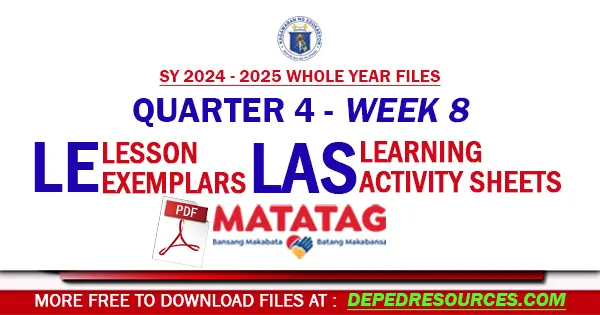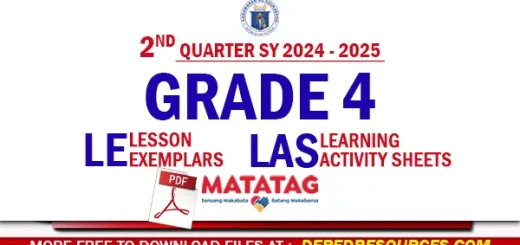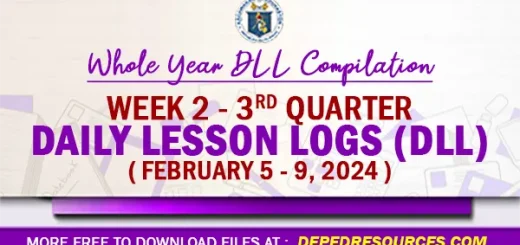Quarter 4 Week 8 Lesson Exemplars (LE) and Learning Activity Sheets (LAS) SY 2024 – 2025
What is a Lesson Exemplar (LE)?
A Lesson Exemplar is a well-structured teaching guide that shows how to effectively deliver a specific lesson by applying appropriate teaching methods. It illustrates how theoretical ideas can be used in real classroom situations to help students better understand the content. Lesson exemplars follow a clear format that includes learning objectives, step-by-step instructions, assessment strategies and examples of expected student responses. These exemplars serve as a useful model for teachers helping them adapt and apply best practices to their own classrooms.
Lesson exemplars effectively incorporate case-based learning theory and cognitive-affective theory of learning into teaching practices. Case-based learning theory emphasizes that students learn better by connecting new knowledge to real-world examples. Using a case in a lesson exemplar allows students to retrieve relevant information from past experiences improving retention and problem-solving abilities. Similarly, cognitive-affective theory highlights that students are more engaged when learning feels meaningful and connected to their goals. Lesson exemplars address both these dimensions by providing practical, relatable examples.
Lesson exemplars enhance knowledge transfer by demonstrating how theoretical concepts apply in real-world situations. When student teachers use exemplars, they develop a stronger understanding making it easier to apply their knowledge in different settings. Studies show that learning through exemplars leads to better retention, improved application of concepts and more positive learning experiences. As a result, using lesson exemplars not only deepens cognitive learning but also boosts student motivation and engagement.
What are Learning Activity Sheets (LAS)?
Learning Activity Sheets (LAS) are instructional materials that guide students in practicing and applying what they have learned. These sheets offer structured tasks that align with the Most Essential Learning Competencies (MELCs)and enable students to work independently especially in modular distance learning setups. LAS encourage active engagement allowing students to deepen their understanding and improve knowledge retention.
With the shift to Modular Distance Learning during the COVID-19 pandemic, LAS became essential in ensuring that learning continued even without face-to-face classes. In kindergarten, contextualized activity sheets address the seven developmental domains: Self-help, Fine Motor, Socio-Emotional, Gross Motor, Cognitive, Expressive Language and Receptive Language. These sheets are carefully designed to meet the unique needs of young learners allowing them to engage in meaningful activities at home with minimal teacher supervision.
Studies show that student worksheets like LAS can significantly enhance student performance by accommodating diverse learning styles and abilities. Research on the use of contextualized LAS in kindergarten revealed that pupils showed notable improvement in post-test results compared to pre-test scores. This indicates that LAS effectively support learning by reinforcing concepts and engaging students, making them a valuable tool in distance education.

 Learn about the information we collect and how it's used.
Learn about the information we collect and how it's used. Discover how we protect your data.
Discover how we protect your data. Understand your rights and choices regarding your personal information.
Understand your rights and choices regarding your personal information.














